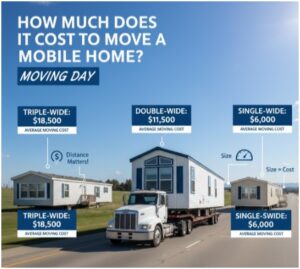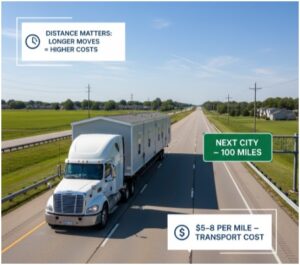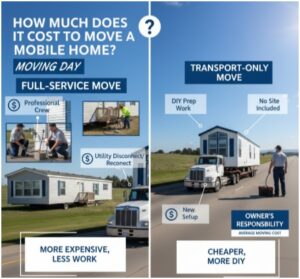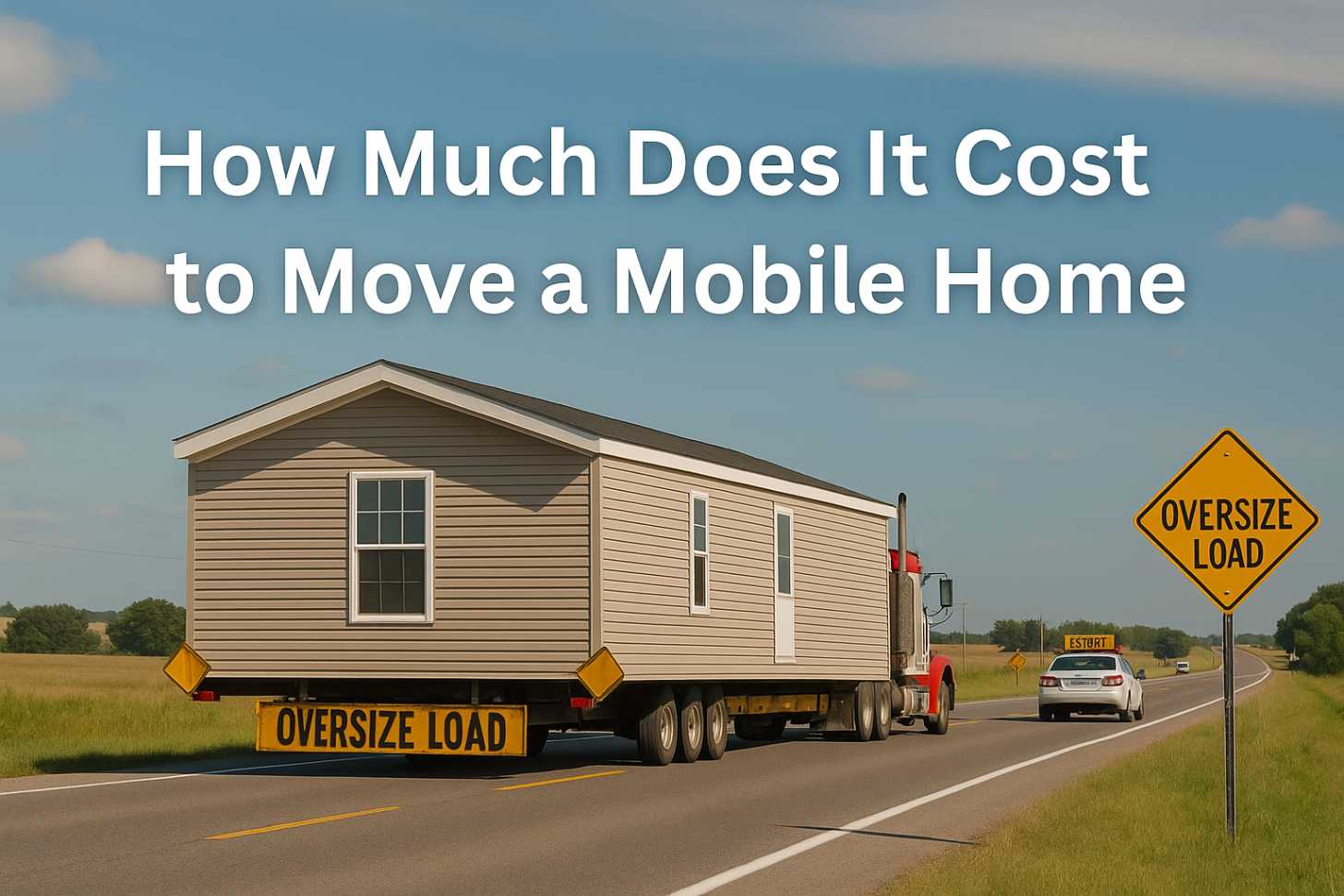I’ll be honest with you—I never imagined I’d know this much about moving a mobile home. But a few years ago, when my aunt decided to relocate her cozy double-wide closer to family, I volunteered to help. I figured it’d be a simple task: hire a truck, hitch the home, and go.
Oh, how wrong I was. By the time we wrapped up the move, I had a crash course in permits, escort vehicles, and setup costs. And the question I heard from everyone along the way was the same: how much does it cost to move a mobile home?
The truth is, there’s no one-size-fits-all number. It depends on size, distance, services, and a dozen other details. But after being deep in the trenches, I can walk you through the real-world costs—and help you plan your move without losing your mind or your budget.
What’s the Average Cost to Move a Mobile Home?

Here’s the straightforward answer: moving a mobile home usually costs between $5,000 and $20,000, with most people paying around $9,000. That’s a wide range, but it makes sense once you realize how many variables are involved.
The home’s size is the biggest factor. A small single-wide is far cheaper to move than a sprawling triple-wide. Here’s a simple breakdown of typical local move costs (under 100 miles):
| Mobile Home Size | Typical Local Cost Range | Average Local Cost |
| Single-Wide | $4,000 – $8,000 | $6,000 |
| Double-Wide | $8,000 – $15,000+ | $11,500 |
| Triple-Wide | $12,000 – $25,000 | $18,500 |
It’s worth noting that local moves cost less than long-distance hauls. Once you cross county or state lines, the price goes up—sometimes significantly.
How Does Distance Affect the Cost of Moving a Mobile Home?

When I helped my aunt, we moved her home just 50 miles down the road. It wasn’t cheap, but it was manageable. If we’d gone a few hundred miles, the bill would have skyrocketed. Distance is one of the most important cost drivers.
For short moves (under 100 miles), you’re usually looking at $1,000 to $9,000 total. That might sound like a huge range, but the low end applies to smaller homes and transport-only services, while the higher end includes full-service moves and larger homes.
For long-distance relocations, moving companies often charge per mile, anywhere from $6 per mile for long hauls to $14 per mile for shorter hauls.
And that’s just the transport cost. If your home is oversized, you might also need escort vehicles, which add $1.50 to $3.50 per mile.
So, if you’re dreaming of relocating your mobile home across state lines, remember that fuel, labor, and overnight stays all pile onto the bill. It’s not just about distance—it’s about everything distance adds.
What Services Are Included in the Cost to Move a Mobile Home?

Here’s something I didn’t realize until we started getting quotes: you’re not just paying to tow the house. You’re paying for a team to make the entire process safe, legal, and smooth.
Most companies offer two types of service, and which one you choose dramatically affects how much you’ll pay:
Full-Service Move
This is the “we handle everything” option. It usually includes disconnecting utilities, securing appliances, transporting the home, getting permits, and setting everything back up at the new location. It’s convenient, stress-free, and pricey—adding several thousand dollars to your total cost.
Transport-Only Move
This budget-friendly option is what it sounds like: the movers transport the home, and you handle everything else. That means disconnecting utilities, prepping the home for transport, obtaining permits, and setting it up once it arrives. It’s cheaper but requires a lot more effort on your part.
If you’re like me and prefer peace of mind over DIY headaches, full-service is worth considering. But if you’re confident handling the prep work and want to save cash, transport-only can significantly cut costs.
What Other Factors Influence How Much It Costs to Move a Mobile Home?
After distance and service type, a few sneaky variables can shift your final price. When I was helping with my aunt’s move, I quickly learned that even the smallest details mattered. Here’s what else plays a role:
Age and Condition of the Home
Older mobile homes can be fragile and need extra work to make them safe for transport. That means more time, materials, and money. If your home hasn’t been moved in decades, expect to pay more.
Site Accessibility
The easier it is to access your current and new site, the less you’ll spend. Narrow roads, steep driveways, or tight corners add labor time and might require special equipment, increasing your bill.
Permits and Inspections
Crossing county or state lines? You’ll need permits from every jurisdiction along the way. Most moving companies handle this for you, but the fees add up. Wide-load moves often require escort vehicles, which cost extra too.
Season and Timing
Summer and the end of the month are peak moving times, so rates are often higher. If you have flexibility, consider moving during the off-season to save money.
How Can You Estimate Your Total Moving Cost?
Here’s my favorite part—doing a little math upfront can save you from sticker shock later. Think about it like this:
- Start with base cost: Use the average cost for your home size from the table above.
- Add distance charges: Multiply the mileage by the per-mile rate (typically $6–$14).
- Include permits and escorts: Estimate $1.50–$3.50 per mile for escort vehicles if needed.
- Factor in services: Full-service could add $2,000–$5,000 to your total.
With these rough numbers, you’ll have a ballpark idea before calling movers. But the most accurate way to know how much does it cost to move a mobile home is still to get quotes from licensed companies.
They’ll assess your specific situation—distance, terrain, size, and condition—and give you a tailored estimate.
Why You Shouldn’t Try to Move a Mobile Home Yourself
I get it—DIYing a move sounds tempting when you see those numbers. But here’s the deal: moving a mobile home yourself is illegal in most states.
It’s not just about having the right truck or trailer. You need permits, inspections, and professional equipment to keep the home stable and secure. Without those, you risk damaging your home—or worse, facing fines and legal issues.
Hiring licensed movers isn’t just a recommendation; it’s a must.
FAQs About How Much It Costs to Move a Mobile Home
Q: Can I move a mobile home for less than $5,000?
A: Possibly, but only if it’s a small single-wide and the move is local. Even then, it depends on how much work you’re willing to do yourself. Most full-service moves cost more than $5,000, especially once you factor in permits and setup.
Q: Does moving a mobile home include reconnecting utilities?
A: Not always. Full-service moves usually include disconnecting and reconnecting utilities, but transport-only moves don’t. Make sure you clarify this with your moving company before signing a contract.
Q: How far can I move a mobile home?
A: Technically, as far as you want—some people move theirs across the country. But long-distance moves cost significantly more and require careful planning. Always budget for higher per-mile charges and additional permit requirements.
Q: Do I need special permits to move a mobile home?
A: Yes. Any move across county or state lines requires permits, and most wide-load moves need them too. Your moving company will usually handle this, but the fees are included in your final bill.
Final Thoughts: Moving Your Home Without Losing Your Cool
If you’ve been wondering how much does it cost to move a mobile home, now you know the truth—it’s not cheap, but it’s doable with smart planning.
Whether you’re paying around $6,000 for a local single-wide move or $20,000 for a long-distance triple-wide relocation, the key is understanding what’s included and where you can save.
If I’ve learned anything from my aunt’s move, it’s this: preparation is everything. Get quotes, understand the services, and don’t skip the legal steps. Do that, and your home will roll into its new spot safe, sound, and ready for a fresh start.










